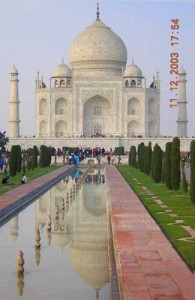Suzan Crane looks back on her years spent living and traveling in India with all of its maddening and inspiring contradictions. (Originally published in Untamed Travel, April 2006)
 If the Creator was on acid, India might well be the manifestation of his/her hallucination. A collage of contradictions, a patchwork of cultures, castes, languages, religions and morals, India is like a huge department store boasting a bedazzling array of products – turn in any direction and the view changes.
If the Creator was on acid, India might well be the manifestation of his/her hallucination. A collage of contradictions, a patchwork of cultures, castes, languages, religions and morals, India is like a huge department store boasting a bedazzling array of products – turn in any direction and the view changes.
Simultaneously confusing, exasperating, exhilarating and inspiring, this is a disparate nation of wealth and poverty, puritanical values and devalued life; where the cow is honoured and woman often dishonored; where sati and wife burning – although illegal – still occurs in remote villages; where a baby in her mother’s arms has already learned to proffer an open palm to extract rupees from a passerby; where tourist babas beg and sexual repression provokes widespread homosexuality and an alarming number of rapes. It is the country that gave the world Ghandi, Mother Teresa, and Amma, “The Hugging Mother,” where Bollywood stars stroll the red carpet while the homeless and infirm carpet the streets. It is a country of gurus and baksheesh-induced officials, hi-tech and low income, a country where Goans and Kashmiris don’t consider themselves Indians and where it sometimes feels as though you need a passport to cross state borders, so diverse are the dialects, geography, clothing and lifestyles.
India is a country of vast expanse and diverse beauty, prone to giving visitors sensory overload and spiritual epiphanies. It would take a lifetime, or several, to fully explore and understand this dichotomous behemoth.
The idiosyncrasies of Indians can be a source of amusement and irritation. When I first arrived, the ubiquitous Indian “head roll,” a noncommittal gesture which I have since adopted, drove me crazy. Is that a “yes” or a “no?”
Subkuch malega, “everything possible,” is an oft-used phrase, until you request something that cannot or will not be honoured. Then the response will invariably be Nei malega, “not possible.” “Not my problem” is a mantra I’ve often heard. Then whose problem is it when the rickshaw breaks down en route to the train station? Well, okay, I guess it’s ultimately my problem when I miss the damn train.
Should your overnight bus from Kasol to Delhi suffer an aneurism, expect a throng of Indian men to stand around idly looking at, not fixing, the engine. Why does it take so many Indians to observe a disabled vehicle? I think there’s a joke in there somewhere. But Indian men like to look. They particularly like to look – shamelessly stare, actually – at foreign women.
Sometimes they like to touch us as well. Although I’ve thus far been spared the experience, I’ve heard stories of Indian men reaching across the aisle of a train’s sleeping compartment to grope a dormant female tourist, despite the nearby presence of her mate. I’ve heard even more disturbing incidents involving public exposure and masturbation. They would never deem to treat an Indian woman in this manner, but foreign women are fair game. The assumption seems to be that we are loose and possibly all prostitutes, an impression likely garnered from the porn sites Indian men enjoy surfing on public computers. (I have logged on more than once to a computer whose last user neglected to exit the porn page he was “reading.”) One woman I know learned to say “penis man” in Hindi to her would-be assailants, an insult intended to thwart unwanted advances. Only recently did she discover that she had actually been insulting them with the term “peanut man.”
Sometimes Indians can be so infuriating. You are lying to me and cheating me, I know. You know I know so why do you persist in doing so? The price on the package clearly says 14 rupees, so why do you charge me 15 rupees… or more? Oh, you don’t have the one rupee change. I see. The dance, the haggle, the cheeky way in which Indians toy with us like a cat taunts its prey before putting an end to its misery. Sometimes it’s all too much. But then the light shines, as it does so often in this land of legends and gods, and I encounter some real heroes as happened last year when I participated in tsunami relief efforts in Tamil Nadu. Working with Indian nationals who tirelessly and devotedly navigated the sea of bureaucratic red tape to expedite the delivery of provisions, instigate rebuilding, get the fisherman back out to sea, provide health and counseling services, and untold other things necessary to victims after such a calamity was an honour and revelation.
I’m pretty new here, relatively speaking. Many I know have been visiting or living in India for decades. Some arrived dazed and bemused, lost in the labyrinth of society’s expectations. A former boyfriend stumbled into India from Italy when he was 19, finding salvation in Hindu teachings and refuge in an ashram. There are thousands like him, reformed Westerners, so to speak.
Lately I’ve been contemplating my time in India, trying to somehow congeal my memories and often bewildering impressions. Like others, I have a love/hate relationship with this country. Sometimes you just need to get out for a while, take a breather and reflect. Many head to Thailand for a respite. But most return, sooner rather than later, as India seems to possess a magnetism more powerful than the pull of gravity. There is so much to do, learn and experience here. It is never boring and always challenging. India assaults and massages one’s sensibilities and you grow here if you are willing. Even when you are lost, you discover the path.




 Global Gypsy Collection ©2010 - 2011
Global Gypsy Collection ©2010 - 2011